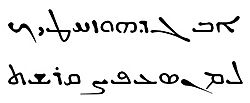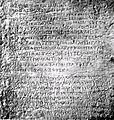Aramaic alphabet facts for kids
The Aramaic alphabet is an ancient writing system. It was first used to write the Aramaic language. This alphabet was created by changing the Phoenician alphabet around the 8th century BC. Over time, it became very important.
Many other languages and alphabets were later developed from Aramaic. For example, the Hebrew square script came from it. The Nabataean, Syriac, and Mongolian writing systems also grew from Aramaic. Even the modern Arabic alphabet is a descendant of the Aramaic alphabet.
The Aramaic alphabet has 22 characters. These characters are mostly used to show consonant sounds. However, some symbols can also show long vowels. For comparison, later alphabets like Hebrew and Arabic mainly use consonants. Hebrew has 22 characters, and Arabic has 28.
Contents
The Aramaic Alphabet: A Brief History
The Aramaic alphabet started in the ancient Middle East. It was used by the Arameans, a group of people who lived in what is now Syria. Their language, Aramaic, became very popular. It was used for trade and communication across a large area. Because of this, the Aramaic alphabet spread widely.
How Aramaic Influenced Other Alphabets
The Aramaic alphabet was like a parent to many other writing systems. When people learned Aramaic, they often adapted its letters to fit their own languages. This is how the Hebrew, Nabataean, and Syriac alphabets were formed. The Arabic alphabet, which is used by millions today, also has its roots in Aramaic. This shows how important the Aramaic alphabet was in shaping how people write.
What Made Aramaic Special?
One interesting thing about the Aramaic alphabet is its focus on consonants. Most of its 22 letters represent consonant sounds. This is common in many ancient writing systems from the Middle East. While some letters could show long vowel sounds, the main idea was to write down the consonants. This is different from alphabets like English, where vowels have their own dedicated letters.
Images for kids
-
Bilingual Greek and Aramaic inscription by the Mauryan emperor Ashoka at Kandahar, Afghanistan, 3rd century BC.
-
One of the Tayma stones: a stele with dedicatory lapidary Aramaic inscription to the god Salm. Sandstone, 5th century BC. Found in Tayma, Saudi Arabia by Charles Huber in 1884 and now in the Louvre.
See also
 In Spanish: Alfabeto arameo para niños
In Spanish: Alfabeto arameo para niños
 | Misty Copeland |
 | Raven Wilkinson |
 | Debra Austin |
 | Aesha Ash |




